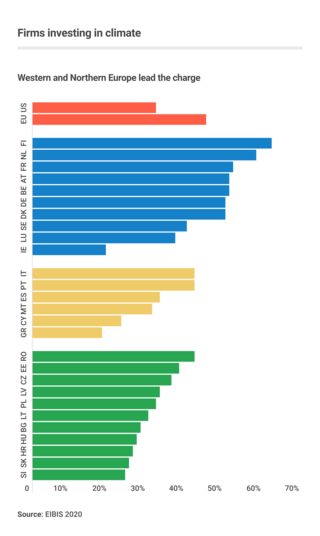Related Research Articles

Natural gas is a naturally occurring mixture of gaseous hydrocarbons consisting primarily of methane (95%) in addition to various smaller amounts of other higher alkanes. Traces of carbon dioxide, nitrogen, hydrogen sulfide, and helium are also usually present. Methane is colorless and odorless, and the second largest greenhouse gas contributor to global climate change after carbon dioxide. Because natural gas is odorless, odorizers such as mercaptan are commonly added to it for safety so that leaks can be readily detected.

Climate change mitigation (or decarbonisation) is action to limit the greenhouse gases in the atmosphere that cause climate change. Climate change mitigation actions include conserving energy and replacing fossil fuels with clean energy sources. Secondary mitigation strategies include changes to land use and removing carbon dioxide (CO2) from the atmosphere. Current climate change mitigation policies are insufficient as they would still result in global warming of about 2.7 °C by 2100, significantly above the 2015 Paris Agreement's goal of limiting global warming to below 2 °C.

Climate Group is a nonprofit organisation with a mission to drive climate action, fast, and achieve a world of net zero carbon emissions by 2050, with greater prosperity for all. The organisation builds influential networks of business and governments to unlock the power of collective action and scale. With its partners, Climate Group drives demand for net zero solutions, moving whole systems such as energy, transport, the built environment, industry and food towards a cleaner future. The organisation and its members are helping to shift global markets and policies towards faster reductions in carbon emissions.

Business action on climate change is a topic which since 2000 includes a range of activities relating to climate change, and to influencing political decisions on climate change-related regulation, such as the Kyoto Protocol. Major multinationals have played and to some extent continue to play a significant role in the politics of climate change, especially in the United States, through lobbying of government and funding of climate change deniers. Business also plays a key role in the mitigation of climate change, through decisions to invest in researching and implementing new energy technologies and energy efficiency measures.
The Investor Network on Climate Risk (INCR) is a nonprofit organization of investors and financial institutions that promotes better understanding of the financial risks and investment opportunities posed by climate change. INCR is coordinated by Ceres, a coalition of investors and environmental groups working to advance sustainable prosperity.

Greenhouse gas (GHG) emissions from human activities intensify the greenhouse effect. This contributes to climate change. Carbon dioxide, from burning fossil fuels such as coal, oil, and natural gas, is the main cause of climate change. The largest annual emissions are from China followed by the United States. The United States has higher emissions per capita. The main producers fueling the emissions globally are large oil and gas companies. Emissions from human activities have increased atmospheric carbon dioxide by about 50% over pre-industrial levels. The growing levels of emissions have varied, but have been consistent among all greenhouse gases. Emissions in the 2010s averaged 56 billion tons a year, higher than any decade before. Total cumulative emissions from 1870 to 2022 were 703 GtC, of which 484±20 GtC from fossil fuels and industry, and 219±60 GtC from land use change. Land-use change, such as deforestation, caused about 31% of cumulative emissions over 1870–2022, coal 32%, oil 24%, and gas 10%.

The United States produced 5.2 billion metric tons of carbon dioxide equivalent greenhouse gas (GHG) emissions in 2020, the second largest in the world after greenhouse gas emissions by China and among the countries with the highest greenhouse gas emissions per person. In 2019 China is estimated to have emitted 27% of world GHG, followed by the United States with 11%, then India with 6.6%. In total the United States has emitted a quarter of world GHG, more than any other country. Annual emissions are over 15 tons per person and, amongst the top eight emitters, is the highest country by greenhouse gas emissions per person.

Fossil fuel phase-out is the gradual reduction of the use and production of fossil fuels to zero, to reduce deaths and illness from air pollution, limit climate change, and strengthen energy independence. It is part of the ongoing renewable energy transition, but is being hindered by fossil fuel subsidies.
New Energy for America was a plan led by President Barack Obama and Vice President Joe Biden beginning in 2008 to invest in renewable energy sources, reduce reliance on foreign oil, address global warming issues, and create jobs for Americans. The main objective of the New Energy for America plan was to implement clean energy sources in the United States to switch from nonrenewable resources to renewable resources. The plan led by the Obama Administration aimed to implement short-term solutions to provide immediate relief from pain at the pump, and mid- to- long-term solutions to provide a New Energy for America plan. The goals of the clean energy plan hoped to: invest in renewable technologies that will boost domestic manufacturing and increase homegrown energy, invest in training for workers of clean technologies, strengthen the middle class, and help the economy.

BP p.l.c. is a British multinational oil and gas company headquartered in London, England. It is one of the oil and gas "supermajors" and one of the world's largest companies measured by revenues and profits. It is a vertically integrated company operating in all areas of the oil and gas industry, including exploration and extraction, refining, distribution and marketing, power generation, and trading.
The milestones for carbon capture and storage show the lack of commercial scale development and implementation of CCS over the years since the first carbon tax was imposed.
The climate change policy of the United States has major impacts on global climate change and global climate change mitigation. This is because the United States is the second largest emitter of greenhouse gasses in the world after China, and is among the countries with the highest greenhouse gas emissions per person in the world. Cumulatively, the United States has emitted over a trillion metric tons of greenhouse gases, more than any country in the world.

Climate change has resulted in an increase in temperature of 2.3 °C (4.14 °F) (2022) in Europe compared to pre-industrial levels. Europe is the fastest warming continent in the world. Europe's climate is getting warmer due to anthropogenic activity. According to international climate experts, global temperature rise should not exceed 2 °C to prevent the most dangerous consequences of climate change; without reduction in greenhouse gas emissions, this could happen before 2050. Climate change has implications for all regions of Europe, with the extent and nature of impacts varying across the continent.

Sultan Ahmed Al Jaber, is an Emirati politician who is the minister of industry and advanced technology of the United Arab Emirates, head of the Abu Dhabi National Oil Company (ADNOC), and chairman of Masdar.

SensorUp Inc. is a Canadian company based in Calgary, Alberta, Canada, specializing in methane emissions management software. It is recognized for its advancements in the oil and gas sector with its methane emissions management SaaS platform, SensorUp GEMS, and for developing the Open Geospatial Consortium SensorThings API standard specification.

Gas venting, more specifically known as natural-gas venting or methane venting, is the intentional and controlled release of gases containing alkane hydrocarbons - predominately methane - into Earth's atmosphere. It is a widely used method for disposal of unwanted gases which are produced during the extraction of coal and crude oil. Such gases may lack value when they are not recyclable into the production process, have no export route to consumer markets, or are surplus to near-term demand. In cases where the gases have value to the producer, substantial amounts may also be vented from the equipment used for gas collection, transport, and distribution.

The Washington Carbon Emissions Fee and Revenue Allocation Initiative, also known as Initiative 1631 or the Protect Washington Act was a ballot initiative that appeared on ballots in the State of Washington in the November 2018 election. The initiative proposed to reduce pollution by levying a fee on greenhouse gas emissions generated within the state of Washington, and using that revenue to support air quality and energy projects, as well as water quality and forest health initiatives. The measure failed with 56.3% of voters rejecting it. As of 2018, more had been spent in campaigning for and against the initiative than on any other ballot measure in Washington history.

Coal, cars and lorries vent more than a third of Turkey's five hundred million tonnes of annual greenhouse gas emissions. They are mostly carbon dioxide and part of the cause of climate change in Turkey. A quarter of the emissions are from electricity generation.

Routine flaring, also known as production flaring, is a method and current practice of disposing of large unwanted amounts of associated petroleum gas (APG) during crude oil extraction. The gas is first separated from the liquids and solids downstream of the wellhead, then released into a flare stack and combusted into Earth's atmosphere. Where performed, the unwanted gas has been deemed unprofitable, and may be referred to as stranded gas, flare gas, or simply as "waste gas". Routine flaring is not to be confused with safety flaring, maintenance flaring, or other flaring practices characterized by shorter durations or smaller volumes of gas disposal.

Rafiga Abdul Agha gizi Huseynzade is an Azerbaijani scientist awarded the "Shohrat Order", a Candidate of Geologico-Mineralogical Sciences, and an honorary member of the Azerbaijan Oil Geologists Society. She is the chair of the Caspian Environmental Protection Initiative (CEPI) and served as the vice president for ecology at the State Oil Company of Azerbaijan Republic (SOCAR) from 2011 to 2023, becoming SOCAR's first female vice president.
References
- 1 2 3 4 5 6 7 8 9 10 11 12 "Oil and Gas Climate Initiative announces progress towards methane target and new CCUS initiative to scale up actions towards climate goals". OGCI. September 23, 2019. Retrieved October 17, 2019.
- 1 2 3 4 5 6 7 8 Gosden, Emily (November 2, 2016). "Oil chiefs try to boost green credentials with new investment fund". The Telegraph. ISSN 0307-1235 . Retrieved October 17, 2019.
- 1 2 3 4 5 Laville, Sandra (September 18, 2019). "'Greenwashing': fossil fuel execs to hold invite-only forum at UN climate summit". The Guardian. ISSN 0261-3077 . Retrieved October 17, 2019.
- ↑ "Paris Climate Agreement Becomes International Law". ABC News. Archived from the original on 4 November 2016. Retrieved 4 November 2016.
- 1 2 Tabuchi, Hiroko (October 16, 2019). "Despite Their Promises, Giant Energy Companies Burn Away Vast Amounts of Natural Gas". The New York Times. ISSN 0362-4331 . Retrieved October 17, 2019.
- ↑ "Natural Gas Flaring and Venting: State and Federal Regulatory Overview, Trends, and Impacts" (PDF). U.S. Department of Energy. June 1, 2019. Retrieved December 31, 2019.
- ↑ Nick Cunningham (December 14, 2019). "Emissions Soar As Permian Flaring Frenzy Breaks New Records". Oilprice.com. Retrieved December 31, 2019.
- ↑ https://methaneguidingprinciples.org/about/our-members/
- 1 2 "The largest US carbon capture and sequestration project to be developed by Wabash Valley Resources with funding support from OGCI Climate Investments". PRNewswire. Terre Haute, Indiana. May 20, 2019. Retrieved October 17, 2019.
- ↑ "SeekOps Secures Venture Funding To Scale Drone-Based Emissions Systems". September 10, 2019. Retrieved October 17, 2019.